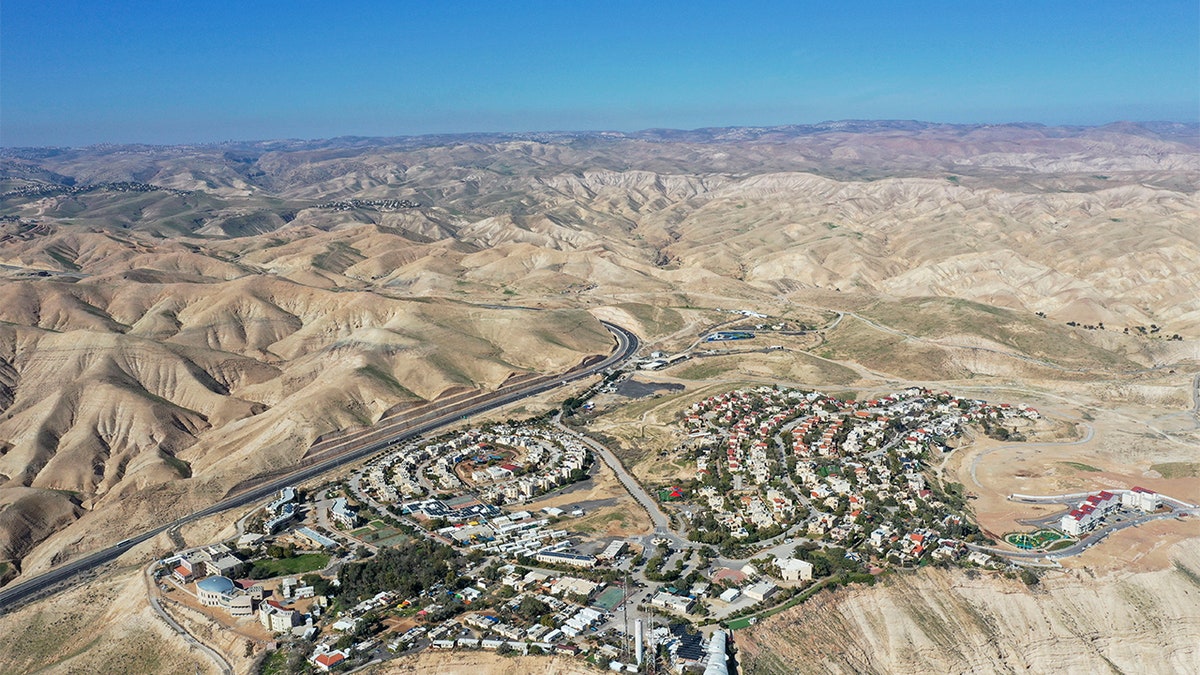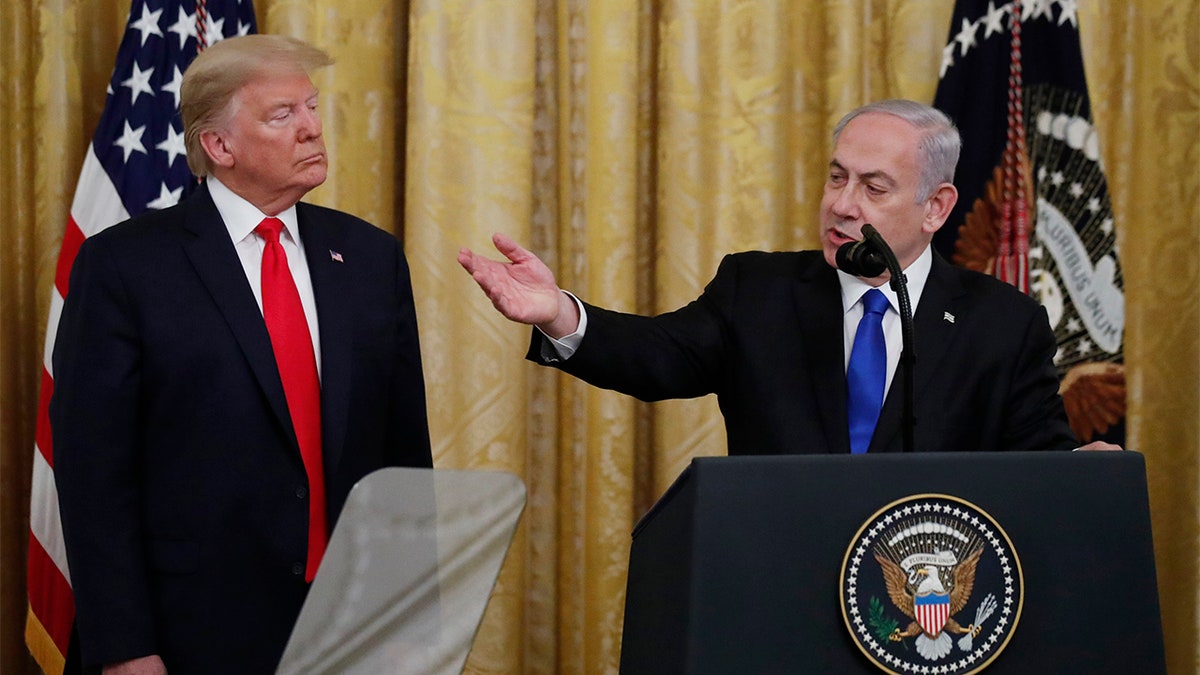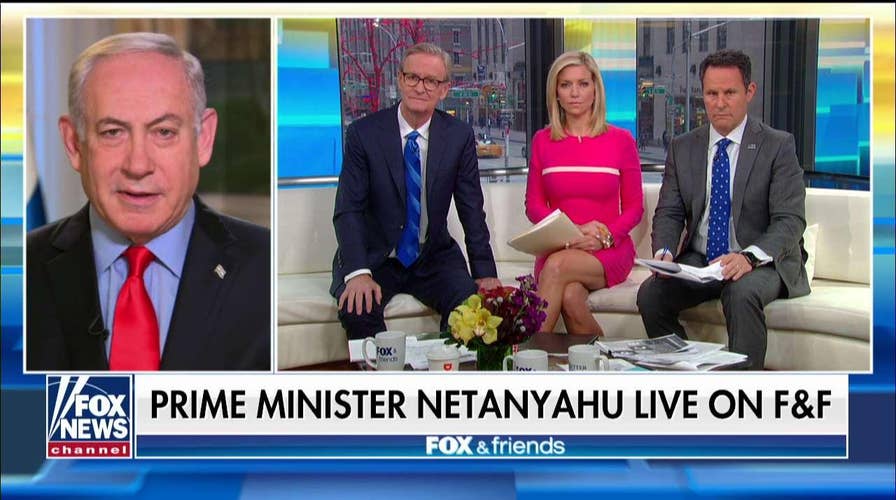Israeli Prime Minister Benjamin Netanyahu reversed his earlier statements about his plan to immediately annex West Bank settlements following the unveiling of President Trump’s Middle East peace plan, saying on Tuesday he would only ask the government to approve the proposed annexation after the March 2 election, according to a report.
Netanyahu, who initially said he would bring the matter to a cabinet vote prior to the election, made the comment about the change of plans at a campaign rally Tuesday night, The Jerusalem Post reported, adding that he appeared to backtrack after the White House asked him to wait several months.
“When we win, we will continue making history,” Netanyahu reportedly said. “When we win, we will extend sovereignty over all the Jewish communities in Judea and Samaria [also known as the West Bank].”

FILE - This Jan. 26, 2020 file photo, shows the West Bank Jewish settlement of Mitzpe Yeriho. As President Donald Trump presented a Mideast plan favorable to Israel, Prime Minister Benjamin Netanyahu on Tuesday, Jan. 28, announced plans to move ahead with the potentially explosive annexation of large parts of the occupied West Bank, including dozens of Jewish settlements. (AP Photo/Oded Balilty, File)
The prime minister also warned that the historic opportunity to annex West Bank settlements with U.S. support would only happen if he received enough votes to form a right-wing government, The Post reported.
When the prime minister was in Washington, D.C., last week, he vowed to act on President Trump’s Mideast peace plan meant to end decades of conflict between Israelis and Palestinians and promised a vote on applying Israeli sovereignty to West Bank settlements within days.

Israeli Prime Minister Benjamin Netanyahu speaks during an event with President Donald Trump in the East Room of the White House in Washington, Tuesday, Jan. 28, 2020, to announce the Trump administration's much-anticipated plan to resolve the Israeli-Palestinian conflict. (AP Photo/Alex Brandon)
Netanyahu initially said the Cabinet would vote Sunday on extending Israeli sovereignty to dozens of Jewish settlements, a move that reportedly provoked backlash from the Palestinians and the European Union (EU). But he appeared to have put that on hold to explore the legal ramifications. He also reportedly faced some backlash from the United States.
Netanyahu clarified on Tuesday that he did not plan to oppose the White House, The Jerusalem Post reported, adding that no other prime minister had managed to secure so many concessions from the U.S. when it came to Israel’s sovereign border, referring to Trump’s Mideast peace plan.
In contrast, Netanyahu’s opponent, Blue and White party leader Benny Gantz, reportedly said he would implement Trump’s Middle East peace plan only with international approval.
“Gantz would not really implement the plan, and if it was dependent on him, this historic opportunity, the likes of which we have not seen since our independence in 1948, would not be carried out,” Netanyahu reportedly said, adding that his party, Likud, “will not let this enormous opportunity fall through our hands.”
Israel has not had a permanent government in a year, following two inconclusive elections, and it's unclear if a caretaker government can embark on such a move.
David Friedman, the American ambassador to Israel, told reporters a joint U.S.-Israeli committee would need to ensure that the extension of Israeli sovereignty matches up with a "conceptual map" released by the Trump administration showing the borders of a future Palestinian state.
The Palestinians angrily rejected Trump’s plan, which would allow Israel to keep all its Jewish settlements in the West Bank, where more than 460,000 Israelis reside, as well as the strategic Jordan Valley. The plan would give the Palestinians limited self-rule over the Gaza Strip, chunks of the West Bank and other far-flung areas. Continuing the Trump administration stance, the president’s peace plan recognizes Israeli sovereignty over the city of Jerusalem -- although it does set up a Palestinian capital in East Jerusalem.
Palestinian President Mahmoud Abbas last week denounced the “nonsense” plan, saying a “thousand no's to the deal of the century.”
CLICK HERE TO GET THE FOX NEWS APP
The Palestinians view the settlements in the West Bank and annexed east Jerusalem -- territories seized by Israel in the 1967 war -- as a major obstacle to peace. That stance is held by much of the international community, which views the settlements as illegal.
Global condemnation may rain down on Israel in varying degrees for defying accepted international laws if it continues with annexation. The International Criminal Court was already preparing to launch a war crimes probe of Israel’s settlement policies.
Fox News’ Bradford Betz and Andrew O’Reilly contributed to this report, as well as The Associated Press.





















